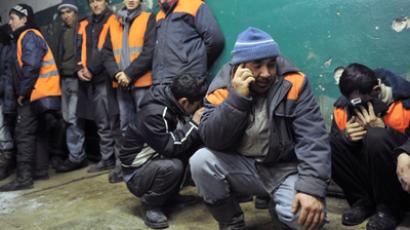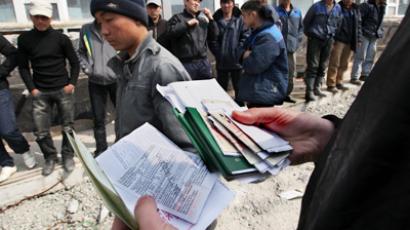Outrage over ‘anti-immigrant patrols’ in southern Russia
The governor of one of Russia’s southern regions has been accused of discrimination and nationalism for a proposal to deploy patrols to tackle immigration issues in the Caucasus region. Human rights activists blasted the governor for his statements.
Governor Aleksandr Tkachev of the Krasnodar region came under fire after a meeting with regional police chiefs on Thursday, where he announced the establishment of a 1,000-member Cossack-staffed volunteer security force. With an annual budget of more than $20 million, the organization would assist police in upholding public order, beginning in September.The force would consist of Kuban Cossacks, a multi-ethnic group descended from farmers, who historically acted as border guards for the Russian Empire. They enjoyed a great degree of political autonomy, both as gratitude for their service and in acknowledgement of their self-sufficiency and militant ethos.Tkachev waded into the hot-button issue of ethnic tension, calling on police officers to embrace their future Cossack partners. The Krasnodar region is predominantly Russian, although roughly one-fifth of its population is of non-Russian ethnicity and have been residing there for decades. Krasnodar borders Russia’s North Caucasus, a conflict-ridden region plagued by high unemployment, forcing its non-Russian Muslim population to head elsewhere to make a living. The influx of migrants has resulted in conflict ranging from cultural disagreements to organized crime and violence.Tkachev argued that Cossacks patrolling the streets of the region alongside police would send a warning to potential criminals: The local population supports the police.
“When we travel to the Caucasus republics or to Europe, we always try to adjust our customs and principles: We don’t speak in our language too loud, don’t act disturbingly. That’s a civilized person’s behavior. But we see our guests behaving differently. They can play their national music at high volume or drive where it is not permitted, drawing attention to themselves and acting impertinently and cynically,” local news website yuga.ru cited the governor as saying.“We all realize that nobody goes against the people, everybody is afraid of it. That’s why when Cossacks are with the law enforces, with the police, you will feel more confident,” he said.He cited the Serbian republic of Kosovo as an example, where conflicts between the traditional Serb population and Albanians settlers spiraled out of control, leading to a bloody and protracted civil war. Tkachev’s administration is resolved to deal with migrants who commit crimes or otherwise disturb public order, he said. Allegations of nationalism surfaceHuman rights activists slammed the governor for his statements, interpreting the remarks as a call to discriminate against Russian citizens living in the Caucasus republics. The Russian Public Chamber said it would request an official probe into Tkachev’s administration.“We will turn to the General Prosecutor’s Office with a suggestion to check the legality of [the Cossack force]. I will also raise the issue during the first session of the Presidential council for interethnic relations this autumn,” Chamber representative Aleksandr Sokolov told the media.“How can anyone hound the Cossacks on people from Caucasus, or vice-versa? Are the people from the Caucasus not Russian citizens?” Lyudmila Alekseeva, head of the Moscow Helsinki group, told Dozhd TV.The outraged comments prompted Tkachev to release a statement saying he was referring to illegal immigrants, not any resident of the Caucasus. Tkachev’s proposal was “merely a recommendation for the police to ramp up control over migration processes,” his office said.There were clashes between migrants and the local population on several separate occasions recently, and the region’s authorities will operate in strict accordance with Russian law to curb illegal immigration, the statement said.Tkachev voiced anger over the criticism on Twitter.“Do you really blame me of nationalism? My first deputy is an Adyghe, my aide is a Crimean Tatar. I have Armenians and Greeks among friends. In case you missed it, I’ve been governing a region with 120 nationalities living in it for 12 years. I know better than many how fragile this world is. Illegal immigration on the other hand is a pressing problem. I was speaking about it,” he wrote.














